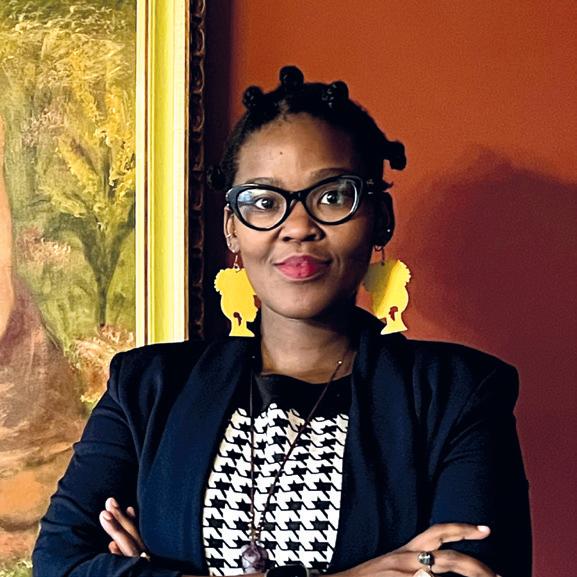Giving Back Moving Forward
Stories of ordinary people making an extraordinary difference











Andrew Myers makes regular gifts to support cutting-edge Parkinson’s research at Sheffield.
Walking in Weston Park as a youngster, Sheffieldborn Andrew admired the reflection of the Arts Tower in the duck pond, promising himself he’d one day study at the University. And he didmore than once, in fact.
After graduating, Andrew spent many years working across the city in social and emergency services. Over time, he began to notice small changes to his walking and arm movements. They quickly became more pronounced, and began to severely affect Andrew’s ability to drive, play his guitar, and explore the Peak District with his beloved dog Chester.

In 2010, aged just 53, he was diagnosed with Parkinson’s disease and was forced to give up his career. Overnight his life changed dramatically. “It knocked me for six,” he recalls. “I’d known something was up for a while, but it seemed like one minute I was rocking along quite nicely, and the next my world was blown apart.”
Already a long-time supporter of student scholarships, when Andrew learned that his university was a world-leader in Parkinson’s disease research, he knew he wanted to help.
The breakthroughs coming out of SITraN - the renowned Sheffield Institute for Translational Neuroscience - give him hope that soon others won’t have to suffer in the way he has. The centre’s pioneering work into individualised treatments particularly inspire him to donate“not just for me, but for all those patients yet to be diagnosed.”
I choose to give not just for me, but for all those patients yet to be diagnosed.
Andrew Myers
Dounia Bakira volunteers to help engineering students follow a similar path to success.

Dounia moved from Morocco with the dream of becoming an engineer, but her path to success in Sheffield was far from straightforward. Arriving as a newly single mother to a two-year-old daughter, she felt “lonely, hopeless and sad…I thought I’d have to quit education completely.” Discovering she’d received a mature student scholarship changed everything for her and her daughter.
“Sheffield found me,” she recalls, “and coming to a Russell Group university, with cuttingedge research in my chosen field, was the best decision I’d ever make.” Throughout her journey, Dounia’s young daughter was always her biggest supporter. Graduating in 2019 with a First class degree was “an emotional, beautiful moment that felt like it was for both of us.”
I was thrilled to challenge stereotypes about women in engineering for the next generation.
Scholarship support gave Dounia the opportunity to fulfil two successful internships with local engineering companies and take an active role in the Women in Engineering Student Society, helping her develop networks and friendships while studying. After securing a management role at South Yorkshire environmental technology firm AESSEAL, she was inspired to continue her relationship with the University, volunteering on projects with engineering students.
“I was thrilled to challenge stereotypes about women in engineering,” she says. The experience not only boosted Dounia’s confidence, it allowed her to reflect on how far she’s come thanks to Sheffield. That’s why she wants to share these achievements with the next generation of “outstanding” young engineers and, of course, her daughter, “She looks up to me as a strong figure who’s grown through great resistance to realise my ambition.”
Dounia Bakira
BEng Chemical Engineering 2019
Jennie Stevens took on an incredible fundraising challenge to help support low-income students.
Jennie’s passion for making a difference led to an incredible feat this year: she took on the 2024 Montane Winter Spine, fundraising for scholarship support. A formidable non-stop race spanning 268 miles of the Pennine Way, ‘The Spine’ challenges runners to get from Edale in Derbyshire to the Scottish village of Kirk Yetholm in just 168 hours.
Along the gruelling route, Jennie battled against daunting terrain, freezing temperatures and otherworldly fatigue. Despite running day and night through lashing rain, often navigating pitch darkness with only a head torch for company, her drive to support better outcomes for low-income students pushed her on.
“There’ll be women out there who think university is something other people do,” Jennie stated before the race. “The idea of studying for a degree makes them wide-eyed with excitement, but they need a little extra support and encouragement. A scholarship can change the life of a bright young person from a low-income household forever - it can be the difference between going to university or not. Those students have the most to gain from university life, but the most to worry about financially if they get here.”
This was my opportunity to help other women achieve their own big dreams, whist also achieving my own.
In the end, Jennie’s determination saw her cross the finish line with a day to spare, raising an incredible £21,600 as she triumphed in the toughest endurance test of her life. “This was my opportunity to help other women achieve their own big dreams whilst also achieving my own,” she says of the experience, “and to me that feels like a huge privilege.”

Inspired by Jennie’s story?
Jennie Stevens Student Support Manager,
University of Sheffield

Chris Whitaker shares his breadth of knowledge on inclusive leadership with disabled students and allies.
When you’ve been exactly where they’re sitting, that connection resonates more strongly.

Chris is Head of Disability at Sport England, and on the Board of Directors at World Disability Billiards and Snooker. He credits his time in Sheffield with teaching him “vital critical thinking skills, in addition to my broader experience - I learned plenty about myself at rowing club, sitting on Damflask Reservoir in the rain!”
He recently volunteered on the University’s Boardroom Masterclass programme, discussing inclusive leadership with students. “I’ve been lucky to have great support, including at Sheffield,” he notes, “and want to give back in the most creative and impactful way I can.” Chris has cerebral palsy, and says that “understanding the value of diversity, I felt I could offer positive perspectives about what’s possible and encourage students planning their onward journeys.”
Dr Chris Whitaker PhD Law 2012
“I got messages saying they’d found it insightful in terms of their own next steps, either as disabled people or as allies, which meant a lot. When you’ve been exactly where they’re sitting, that connection can resonate more strongly than you may think. We all understand the importance of financial giving, but the value of giving someone an hour or two of your time is often underestimated.”
Chris is looking forward to volunteering again and wants to encourage others to get involved. Reconnecting with the University in this way has, he said, allowed him, “chance to reflect personally, in a busy world, on the contributions I make as I go forward. It’s been a great way to have a positive impact.”
Friends Bernard Tinker and Bill Walsh left matching gifts in their Wills to help the next generation of Sheffield students.
Bernard and Bill met as Sheffield undergraduates in the late 1940s, soon bonding over advanced chemistry research and campus sports. Rugby, squash, soil science and the Union Academic Committee were all key facets of their storied and fondly remembered time as inseparable friends at the University.
The deep kinship they cultivated as undergraduates would endure throughout the rest of their lives, with each crediting the other as a best friend and valued advisor for the next 60-plus years. Even more influentially, both men met their future wives in the city: Bill went on to marry Julia after meeting at the University; and Bernard married Maureen, a nurse at the Royal Sheffield Hospital.
Following graduation, the two bright young chemists would both stay on to complete PhDs, before embarking on different but equally fascinating professional journeys as organic chemists. Bill became a successful industry executive with companies such as Reckitt, while Bernard emerged as a leading expert in global palm agriculture, and later a Director at the National Environment Research Council.
This legacy of a lifelong friendship forged in Sheffield will help students long into the future.

Professor Bernard Tinker OBE and Dr William “Bill” Walsh
BSc Chemistry 1951, PhD Chemistry 1954 & 1955


Looking back over his experiences at Sheffield, Bernard remembered the Steel City as a pivotal place in his life, viewing it as “a formative and happy time”. He even credits Sheffield’s student scene for kickstarting his lifelong love of dance, developing (in his own words!) “a good sense of rhythm, though my legs were always a bit clumsy.” Bill, in turn, received Union backing for a comedic student society, and developed a passion for documenting his surroundings with striking photography - including the wonderfully nostalgic snap of Bernard as an undergraduate in the 1950s seen here.
Having enjoyed a decades-long friendship forged in Sheffield, both men felt deeply moved to give something back to the place that first brought them together. Aiming to help future generations of students follow in their footsteps as inquisitive scholars and enduring allies, they each left a gift of £10,000 in their Wills. Together, the Bernard Tinker Scholarship and the Bill and Julia Walsh Scholarship help students from underrepresented backgrounds continue their scientific education.
Thanks to them, Natalie Stokes achieved a Drug Discovery Science MSc in 2023, stating: “The impact of the scholarship on my personal life and student experience at Sheffield has been profound, allowing me to fully immerse myself in the learning experience. I want to express my deepest gratitude for their incredible generosity - I am truly humbled and appreciative.” A fitting reflection of how both men felt about their beloved alma mater, where their influence continues to make a difference today.
What will your legacy be?
Let us know by completing the enclosed form.
Emilie Kofler gives her time to inspire and encourage other underrepresented students.
Emilie was the first in her family to attend university. A drive to study international business and languages led her to Sheffield, and it proved to be an inspired choice. With no financial backing from home, Emilie was awarded a scholarship and bursary to help realise her dream. Without it, she “wouldn’t have been able to survive” the year in Spain required by her course: “I was working incredibly hard to prove I’d made the right choices…it’s huge pressure, and that backing makes all the difference in the world.”

Emilie also benefited from Sheffield’s Northern City Connections programme, where alumni volunteers share their experience with underrepresented students. This proved inspiring enough to her that, now a graduate in a global role at HSBC, she recently returned as a volunteer herself. “My first talk in front of that many people was amazing, I felt so accomplished and proud,” she reflects. “It was a privilege to share the knowledge I’d gained, and really helped me see how far I’d come.”
“I’m excited to do more volunteering in futurethere’s just an instant connection when someone asks for advice saying, ‘I’m a Sheffield student…’. This place will always have a piece of my heart and I’d love to keep giving back where I can.”
There’s an instant connection when someone asks for advice saying, “I’m a Sheffield student...”.
Inspired by Emilie’s story?

Emilie Kofler
Jeffrey House generously supports PhD scholarships for students carrying out vital research into the causes of depression.
I want to erode the stigma around mental health.
Jeffrey followed several former schoolmates to Sheffield in his Triumph Spitfire, having received financial support to continue his education in the Steel City. Nostalgic memories from his time here include a steep and snowy trek home from an epic Led Zeppelin gig, and directing Paul McCartney’s tour van across campus before a surprise Wings show.
Relocating to California in the 1980s, Jeffrey soon went on to launch his own pioneering drinks brand, Ace Cider - but even as business flourished, Jeffrey found himself battling bouts of depression. His recently published autobiography, The Cider King: How I Ace’d It, tells the colourful story of building a successful company while often struggling with his own mental health. Reflecting on the huge impact the illness has had on his life, he now feels driven to make a difference for people walking a similar path.
Jeffrey House BA Economics 1972

Today, Jeffrey is a proud supporter of Sheffield’s cutting-edge research into depression. His kind gifts help fund PhD scholarships for students exploring early genetic detection models. “I know the University does world-class neurological research,” he says. “I want to help erode the stigma around mental health and alleviate some of that pain for others in future.”
“Sheffield was good to me, and I want to be good to my alma mater. If I can help improve the happiness function by supporting some very bright people looking to shed more light on these illnesses, then that’s a wonderful thing.”
Sikose Mjali gives regularly to pay forward the support that made her ambitions a reality.
It feels great being a donor to Sheffield - it reconnects me to my university and I love seeing how I’m helping.
As a talented student who flourished with the help of scholarship support, Sikose’s bond with the University was heartfelt from day one. Before graduating, she helped raise money as a student caller; now based in Seattle, lecturing and studying for a PhD, Sikose remains an active and valued member of the regular donor community.
“The support I got changed everything,” Sikose explains. “Sheffield was instrumental to my success, and I’ve never forgotten that. The hours in the library, nights dancing away in the SU, pie and peas with Henderson’s, ‘Ta duck!’ on the bus…more than just fond memories, it’s a feeling of belonging to this community that has always stayed with me.”

“When I graduated, I made sure to set up a regular gift so that help is consistently there for those who need it most. I don’t think of it as something I give, rather as something I give back. I benefitted so much, I see it as my duty and my privilege to pay that forward where I can.”
“It feels great being a donor to Sheffield - it reconnects me to my university and I love seeing how I’m helping,” says Sikose, who has since volunteered with the Alumni Foundation and even run a sponsored half-marathon in South Africa. “I know first-hand that every gift truly makes a difference, and it fills my heart with joy to do something for those who need the same support I had.”
Make a regular gift and you’ll join Sikose as a member of the Sheffield Made community. The name reflects both the impact Sheffield has had on you, and the impact your generosity will have on the next generation.
Sikose Mjali
BA English Language and Linguistics 2011, MA Applied Linguistics TESOL 2012



